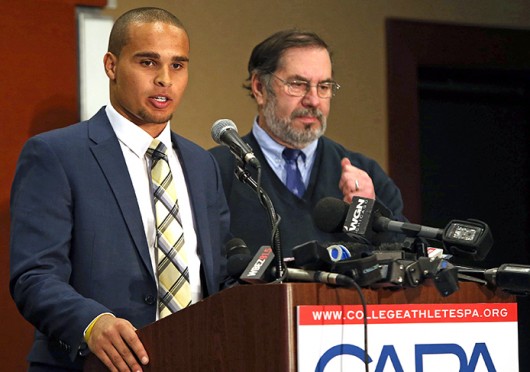
Former-Northwestern quarterback Kain Colter (right) answers questions after announcing that Northwestern football players wish to join a labor union Jan. 28 at the Hyatt Regency in Chicago.
In the past few years, the term “lockout” was only used in reference to professional teams. Now, the same term could be applied to college players.
Tuesday, the president of the National College Players Association, Ramogi Huma, filed a petition on behalf of the Northwestern football players with the National Labor Relations Board, the federal agency that recognizes groups seeking collective bargaining rights. The petition was filed in an attempt to let the athletes unionize.
The athletes, led by former-quarterback Kain Colter, want representation to improve the conditions under which they play. They want the university to pay for any injuries they receive and scholarships to cover the full cost of attendance (cost of attendance at Northwestern University is $63,228 for the 2013-14 school year, according to the university’s website). So far the players aren’t asking to be paid anything beyond scholarship money for playing, but ESPN speculates they might.
While it’s unlikely that the proposal will go through — most court decisions in the past few years have stated the athletes are students, not employees — the NCAA doesn’t want it to.
“This union-backed attempt to turn student-athletes into employees undermines the purpose of college: an education. Student-athletes are not employees, and their participation in college sports is voluntary,” NCAA chief legal officer Donald Remy said in a statement released in response to the filing.
Maybe in any Division III school. But not here.
Northwestern is a member of one of the five so-called “power conferences” which include the SEC, Big Ten, Big 12, Pac-12 and the ACC. Not one of the schools in these conferences offer any sort of representation to “student-athletes.”
At many schools, the fame and scholarships that come with playing on these big teams are considered reward enough. But with 40 hours of practice a week, students leaving class to compete and priority scheduling to make sure students can actually get in the required amount of class with the required amount of practices, the so called benefits don’t look as impressive.
With those facts, it sounds good for football players to unionize.
“The action we’re taking isn’t because of any mistreatment by Northwestern,” Colter said in an interview with ESPN’s Outside The Lines explaining why he wanted to unionize. “We love Northwestern. The school is just playing by the rules of their governing body, the NCAA. We’re interested in trying to help all players — at USC, Stanford, Oklahoma State, everywhere. It’s about protecting them and future generations to come.
“Right now the NCAA is like a dictatorship. No one represents us in negotiations. The only way things are going to change is if players have a union.”
There is one other thing the NCAA could do, and that is scale college football back to what it should actually be: not such a big deal.
One day, even the best in the NFL leave. They have to do something else with their lives. They’ll need another job, and not all of them can become ESPN commentators. College should teach athletes that academics should come first.
Ohio State officially refers to its athletes as “student-athletes,” meaning they are students first, but the amount of days athletes miss for their respective sports is ridiculous.
Maybe it’s time college sports turned away from forcing students into spending all their time at practice.
But who are we kidding? The NCAA isn’t going to lose that $5.15 billion in revenue. The universities involved aren’t going to stop trying to attract people from around the world to compete in their sports programs. They don’t want to lose the prestige and tradition that comes out of their sports.
So maybe the answer to all this is to allow students to bargain. Northwestern, we salute you. OSU? We need to be right behind them.


